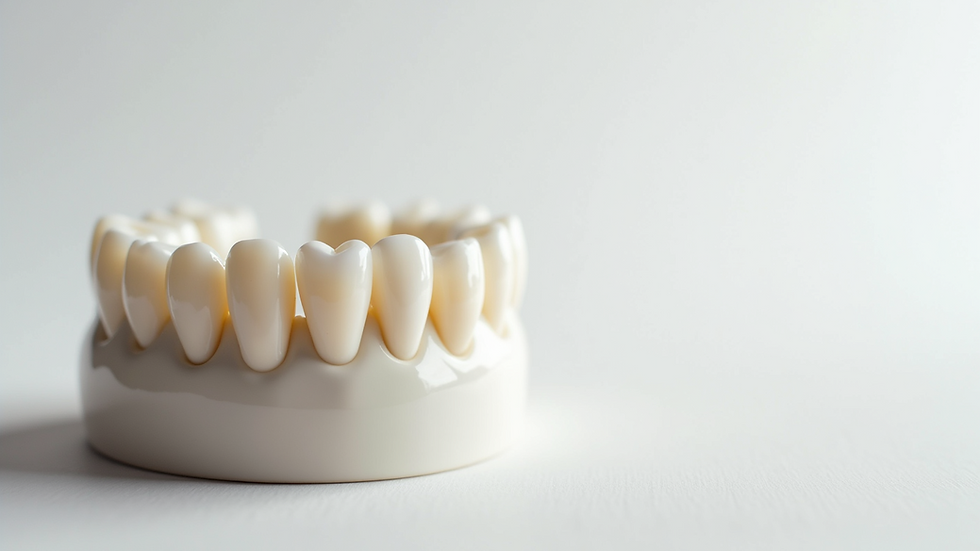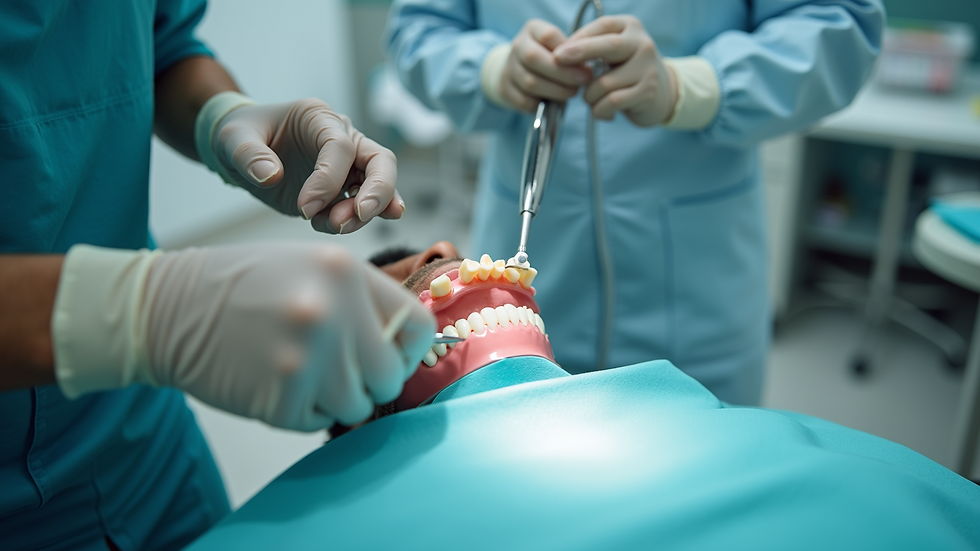Everything You Need to Know About Dental Crowns
- melbournestreetden
- Jul 18, 2025
- 4 min read
Dental crowns are a common and effective solution for restoring damaged teeth, improving aesthetics, and maintaining oral health. If you're considering getting a dental crown or just curious about their function, this comprehensive guide covers everything you need to know, from the types available to the treatment process and costs involved.
What Are Dental Crowns?
Dental crowns, often referred to as caps, are custom-made coverings placed over damaged or weakened teeth. They serve several purposes, including:
Protection: Crowns safeguard weak or fractured teeth from further damage.
Restoration: They restore the shape, function, and appearance of teeth that have been extensively damaged or decayed.
Support: Crowns can hold together parts of a tooth that may be cracked or worn down.
Aesthetic Improvement: They enhance the appearance of discolored or misshapen teeth.
Making a decision to get a dental crown often comes after consulting a dentist, who will evaluate the specific needs of your dental situation.

Types of Dental Crowns
There are several types of dental crowns available, each with its distinct advantages. Understanding the differences can help you make an informed choice about which option is best for you.
1. Porcelain Crowns
Porcelain crowns are popular for their natural appearance, mimicking the look of regular teeth. They are ideal for front teeth, as they blend seamlessly with the surrounding teeth.
2. Metal Crowns
Metal crowns, made from alloys such as gold or other metals, are highly durable. They are often used for back teeth due to their strength and resistance to wear. However, their metallic look is less aesthetic compared to porcelain crowns.
3. Composite Resin Crowns
Composite crowns can be made to match the color of natural teeth, making them an attractive alternative. They are not as durable as porcelain or metal crowns but can be a good choice for a budget-friendly restoration.
4. Zirconia Crowns
Zirconia crowns offer the benefits of both porcelain and metal. They are incredibly strong, resist chipping, and can look very natural. Many choose these crowns for their durability and aesthetic qualities.
5. Temporary Crowns
Temporary crowns are used to protect the tooth while waiting for a permanent crown. They are usually made from acrylic or stainless steel and are less durable, serving mainly as a placeholder.

How Are Dental Crowns Placed?
The process of getting a dental crown typically involves two visits to your dentist. Here’s a step-by-step overview of what to expect:
First Visit
Evaluation: Your dentist will evaluate your tooth and take X-rays to determine the extent of the damage.
Preparation: The tooth receiving the crown is numbed using a local anesthetic. The dentist then reshapes it to accommodate the crown by reducing its size.
Impression: After preparing the tooth, an impression is taken to create a custom crown. This can be done with traditional molds or digital scans.
Temporary Crown: A temporary crown will be placed on your tooth to protect it until the permanent crown is ready.
Second Visit
Crown Placement: Once the permanent crown is ready (typically 2-3 weeks later), you will return to the dentist.
Fitting: Your dentist will remove the temporary crown and check the fit and color of the permanent crown.
Cementation: If everything looks good, the permanent crown is cemented in place. The dentist may adjust the bite if necessary.

How Much Does It Cost to Get a Crown Done at the Dentist?
The cost of a dental crown can vary widely based on several factors, including:
The type of material chosen for the crown.
The complexity of the procedure and the extent of the damage.
Geographical location and the experience of the dentist.
On average, you can expect to pay between $800 and $1700 for a dental crown. For specific information regarding the dental crowning cost, it’s best to consult your local dental office or insurance provider, as coverage can vary.
Insurance Coverage
Many dental insurance plans cover a portion of the crown cost, particularly if the crown is considered medically necessary. Be sure to check with your provider about benefits related to dental crowns.
Care and Maintenance After Getting a Crown
After receiving a dental crown, proper care is essential to ensure its longevity. Here are some tips for maintaining your crown:
Practice Good Oral Hygiene: Brush your teeth twice a day and floss daily to prevent decay around the crown.
Avoid Hard Foods: Be cautious with hard and sticky foods, which can damage the crown or dislodge it.
Regular Dental Check-Ups: Visit your dentist regularly for check-ups and cleanings to monitor the crown's condition.
By following these care tips, you can maximize the lifespan of your dental crown and maintain your overall oral health.
When to Consider Getting a Dental Crown
There are several situations where getting a dental crown is advisable:
Severe Tooth Decay: If a sizable cavity cannot be repaired with a filling, a crown may be necessary to restore the tooth.
Cracked or Worn Teeth: For teeth that are extensively cracked or worn down, crowns can provide the needed strength and protection.
Root Canal Treatment: Teeth that have undergone root canal therapy often require crowns to restore function and stability.
Misshapen or Discolored Teeth: Crowns are an excellent way to improve the aesthetic appeal of teeth that are oddly shaped or stained.
Is Getting a Dental Crown Worth It?
While the procedure may involve a financial investment and a couple of visits to the dentist, the benefits of dental crowns frequently outweigh the costs. A dental crown can:
Prevent further tooth damage and possible extraction.
Restore normal function for biting and chewing.
Improve the appearance and aesthetics of your smile.
If you’re facing dental issues that require attention, consider discussing the option of dental crowns with your dentist.
Final Thoughts
Understanding the role and function of dental crowns can help you make informed decisions about your dental health. Whether you’re considering getting a crown to restore a damaged tooth or for cosmetic reasons, knowing what to expect and how to care for your crown will ensure you reap the rewards for many years to come. Remember, your smile is an essential aspect of your overall health, so prioritize it with the right dental treatments!




Comments